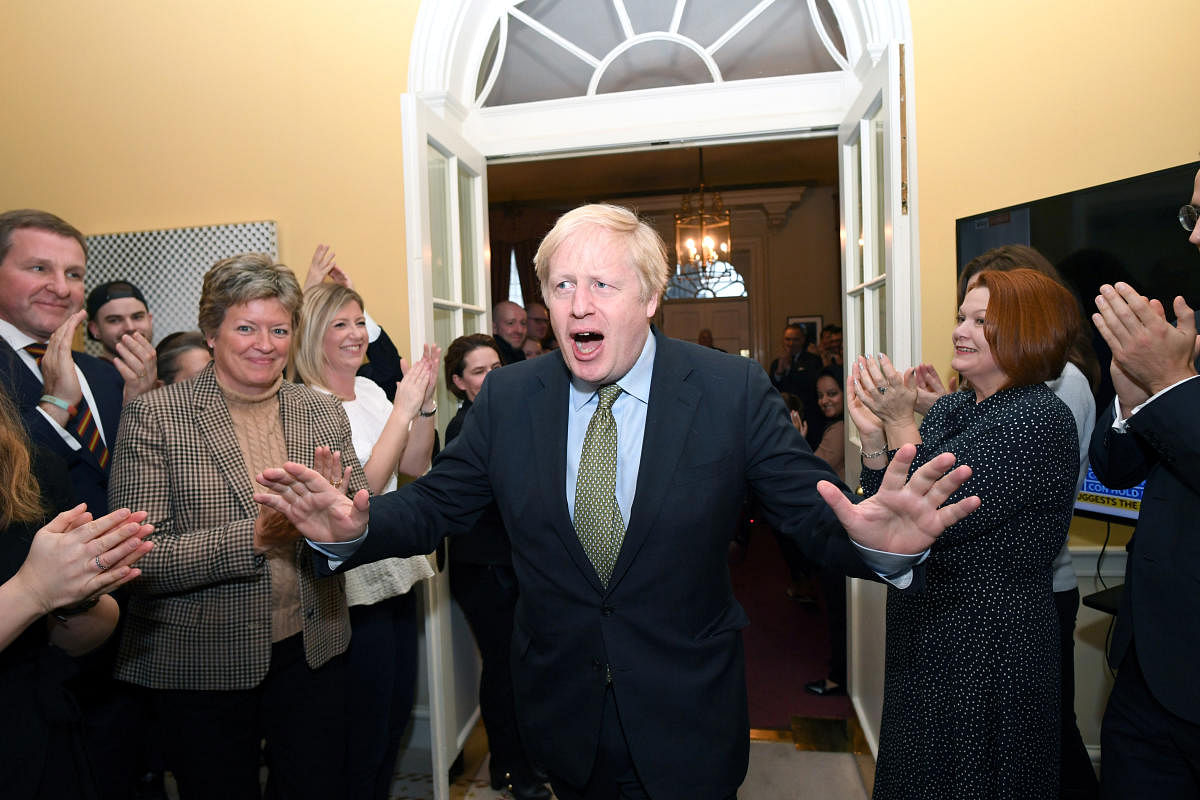
Boris Johnson concluded his early morning victory speech today like only a journalist gifted with the pen of humour can. “Ladies and gentlemen, so let’s get Brexit done. But first let’s get breakfast done,” he said. Perhaps this was the Johnson burp having had the Opposition Labour Party and its beleaguered leader Jeremy Corbyn for breakfast. In the snap general elections held in the UK, Johnson’s Conservative and Unionist Party secured a landslide 364 seats in a house of 650 and the comfortable cushion of a 78-seat majority. With his thumping win today, Brexit will finally be done, but the United Kingdom may be undone.
In an election forced by the parliamentary logjam over the modalities of exiting the European Union mandated by the referendum of 2016, Brexit provided the context and crux for the contest. The Conservatives kept their slogan simple: Let’s get Brexit done. In contrast, the Labour Party, in the main, offered two things: Unprecedented levels of public spending that even its traditional voters did not consider credible (does Nyay come to mind?); and plenty of dithering on the question of Brexit.
Fresh fault lines
The result, while not wholly surprising, has fundamentally reshaped the political geography of UK. Britain has seen bigger electoral victories. Under Tony Blair, Labour won two consecutive elections with more than 400 seats each time of asking. But Labour hasn’t lost as badly since 1935.
But the big story is the complete reversal of the support base of the two major British parties. The Conservative Party, for long the natural party of governance, traditionally drew its support base from the affluent southern towns and countryside of England. The Labour Party’s strengths lay in the industrial and poorer north of England so much so that a vast tract of land from the country’s north west coast to the east was known as the Red Wall that the conservatives have hardly ever managed to penetrate. But in post-Brexit Britain, the Red Wall now has big blue holes.
These, after all, were the regions that voted heavily to leave the European Union. The mines had long disappeared, and the once thriving factories and shipyards of the north too vanished under the force of globalisation. Its people were convinced that cheap immigrant labour from eastern Europe and stifling EU regulations had made their lives more miserable. In such ‘leave’ strongholds, the Conservative Party in 2019 has won seats it has never managed to in the past. A vast number of die hard labour supporters who couldn’t dream of voting Conservative seem to have “lent” Johnson their vote in a Brexit election. The labour’s catchment now remains restricted to blue-collar workers in London and the big cities and young cosmopolitan liberals whom Brexit would hurt most, and ethnic minorities.
Broken Britain
While there is no ambiguity about Brexit now, the union of UK appears shakier than ever. Almost 60 per cent of Scotland had voted to remain in the EU. The Scottish National Party (SNP) that governs the region has won 48 of the 59 House of Commons seats, increasing its vote share by some eight per cent. With such overwhelming support, the SNP has already started pushing for a new independence vote after the first in 2014 was defeated. It will be hard for the new government to drag the Scots out of the EU on the basis of a majority won entirely in England. In Northern Ireland too, the nationalist outfits led by Sinn Fein – that seek the territory’s unification with Ireland – for the first time outnumber the Unionists (those who support being in the UK) in the House of Commons.
The contrasting approach of the Labour and Conservative parties to the campaign makes for an interesting political case study. In their ruthless pursuit of power, the Conservatives had no qualms in sacrificing Teresa May as prime minister earlier this year and quickly coalescing around Boris Johnson. Despite being dissed by his opponents as a “liar”, “far-right fundamentalist” and “clown”, Conservatives knew only Johnson had the feel-good factor to take them into electoral territory out of bounds for most others in the party. Meantime, the Labour Party had been turned into a cult of Corbyn. The empty idealism of the Corbynistas made little sense even for Labour lifers. People who could not prove their ideological purity were purged from the Party. His incompetence and arrogant refusal in dealing with rampant anti-Semitism in the Party made its claims to liberalism seem increasingly hollow. Corbyn the bogeyman supplied an endless stream of electoral gifts to Boris Johnson.
As is usually the case with such campaigns cloaked in self-righteousness, the only constituency where decisive victories can be scored is the social media.
(TR Vivek is a Bengaluru-based journalist)
Disclaimer: The views expressed above are the author’s own. They do not necessarily reflect the views of DH.